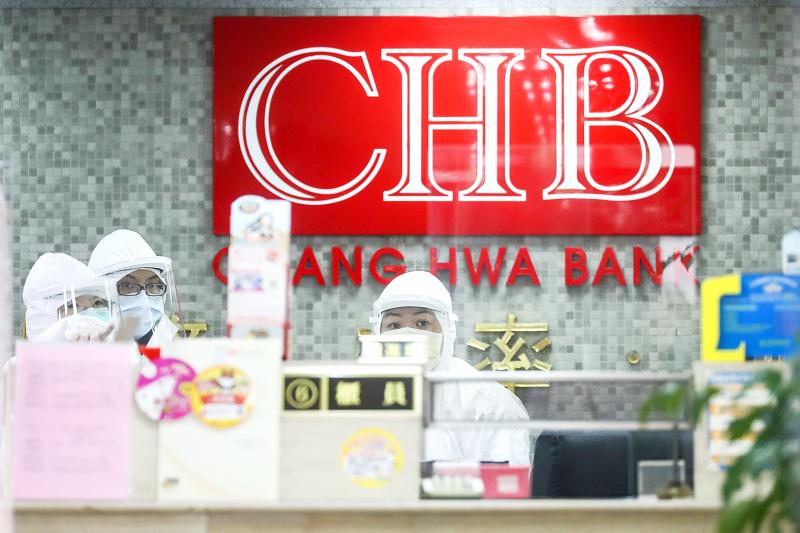State-run Chang Hwa Commercial Bank (CHB, 彰化銀行) aims to keep business growth targets for this year unchanged as many economies around the world recover from the COVID-19 pandemic, the bank said yesterday.
“We strive to boost profitability this year as planned, being aware that the COVID-19 pandemic poses lingering uncertainty at home and abroad,” CHB spokesman Chen Bin (陳斌) told an online investors’ conference in Taipei.
Chen gave the cautiously optimistic outlook after the bank’s financial performance continued to disappoint in the first quarter of this year.

Photo: CNA
Pretax income fell 23 percent year-on-year to NT$2.38 billion (US$85.86 million), while net profit shrank 7.5 percent to NT$6.9 billion, or earnings per share of NT$0.19, company data showed.
The soft earnings were because financing weakened amid the worldwide COVID-19 crisis, and interest rate cuts by global central banks squeezed interest and fee incomes, the bank said, adding that a conservative investment strategy also weighed on trading income.
Interest spread for loans in local and foreign currencies was 1.18 percent last quarter, while net interest income averaged 0.86 percent, it said, adding that both rates were lower than in the previous quarter.
Sentiment has improved, as evidenced by an increase in syndicated loan interest and other banking operations, Chen said, attributing the trend to the rollout of COVID-19 vaccines in the US and Europe.
CHB would increase its overseas banking operations, he said, adding that the bank’s domestic operations would target clients with high net worth.
Overseas branches and local branches’ offshore banking units generated 28.8 percent of pretax profit, down from an average of 37.5 percent last year, Chen said, adding that their contributions would likely gain momentum later this year.
CHB said that it raised stakes in local equities last quarter, and would acquire more local and foreign bonds this quarter to raise yields.
The lender said it would respect the decision by major shareholder Taishin Financial Holding Co (台新金控) to sell its stake in CHB to end a long-standing management dispute with the Ministry of Finance, another major shareholder.
A local COVID-19 outbreak is dampening sales of wealth management products, but the effect would likely be temporary if the authorities keep infections at bay, CHB said.

Taiwanese suppliers to Taiwan Semiconductor Manufacturing Co. (TSMC, 台積電) are expected to follow the contract chipmaker’s step to invest in the US, but their relocation may be seven to eight years away, Minister of Economic Affairs J.W. Kuo (郭智輝) said yesterday. When asked by opposition Chinese Nationalist Party (KMT) Legislator Niu Hsu-ting (牛煦庭) in the legislature about growing concerns that TSMC’s huge investments in the US will prompt its suppliers to follow suit, Kuo said based on the chipmaker’s current limited production volume, it is unlikely to lead its supply chain to go there for now. “Unless TSMC completes its planned six

Intel Corp has named Tasha Chuang (莊蓓瑜) to lead Intel Taiwan in a bid to reinforce relations between the company and its Taiwanese partners. The appointment of Chuang as general manager for Intel Taiwan takes effect on Thursday, the firm said in a statement yesterday. Chuang is to lead her team in Taiwan to pursue product development and sales growth in an effort to reinforce the company’s ties with its partners and clients, Intel said. Chuang was previously in charge of managing Intel’s ties with leading Taiwanese PC brand Asustek Computer Inc (華碩), which included helping Asustek strengthen its global businesses, the company

Power supply and electronic components maker Delta Electronics Inc (台達電) yesterday said second-quarter revenue is expected to surpass the first quarter, which rose 30 percent year-on-year to NT$118.92 billion (US$3.71 billion). Revenue this quarter is likely to grow, as US clients have front-loaded orders ahead of US President Donald Trump’s planned tariffs on Taiwanese goods, Delta chairman Ping Cheng (鄭平) said at an earnings conference in Taipei, referring to the 90-day pause in tariff implementation Trump announced on April 9. While situations in the third and fourth quarters remain unclear, “We will not halt our long-term deployments and do not plan to

TikTok abounds with viral videos accusing prestigious brands of secretly manufacturing luxury goods in China so they can be sold at cut prices. However, while these “revelations” are spurious, behind them lurks a well-oiled machine for selling counterfeit goods that is making the most of the confusion surrounding trade tariffs. Chinese content creators who portray themselves as workers or subcontractors in the luxury goods business claim that Beijing has lifted confidentiality clauses on local subcontractors as a way to respond to the huge hike in customs duties imposed on China by US President Donald Trump. They say this Chinese decision, of which Agence